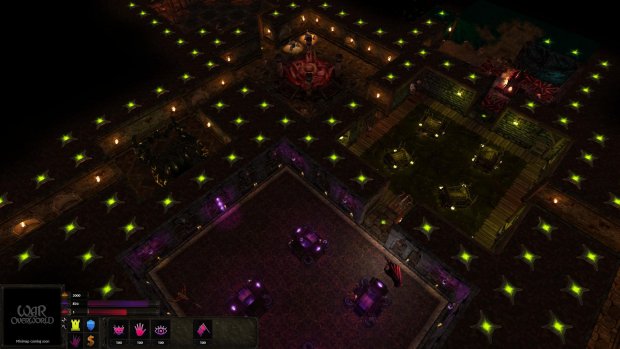Dungeon Keeper Vs. War For The Overworld
IT'S ALIIVE
Giant corporations traducing classic games to swing a buck – dontcha love 'em? A top-of-the-line current example is EA Mythic's ongoing brutalisation of first Ultima and now Dungeon Keeper into bad freemium tablet games. “If you want to play Dungeon Keeper or Dungeon Keeper 2,” says senior producer Jeff Skalski, flipping the bird and using a golden zippo to torch the Bullfrog logo, “go to Good Old Games and download them.” At first I considered this a slightly dickish thing to say but, after playing the kickstarted War for the Overworld, I've come to realise Skalski has a point.
Let's take a look at what happens when Dungeon Keeper gets remade by its biggest fans.
The brainy among you may recall War for the Overworld being kickstarted at the turn of 2012/13 and eventually pulling in a cool £210K, all on the premise and promise of nostalgia – a game heavily inspired by Dungeon Keeper, made by a team that included some of the original series' most dedicated modders. Sometimes I wring my hands about progress but, in this case, make no apologies for having the excitement of a rose-tinted manchild about the idea.
Since hitting its funding target, development of WFTO shows that – while nothing disastrous has happened – the best-laid plans of mice and modders gang aft agley. The original pitch was rather uncompromising about promising the base game would be released on August 30 2013, a date that has came and went. The 'Bedrock Beta', which we'll look at in more detail shortly, is far from a finished game. So I asked creative director Josh Bishop what's going on.

“It took some time to take a group of geographically diverse people and grow into a functional group of developers,” says Bishop. “Since then we've made significant progress on the game – we’re just about to push out our first release of the Linux-based build with Mac OS X to follow shortly. From a development perspective we’re progressing faster than we have ever been.”
But the game isn't out. “Our original and regrettably specific date has slipped,” says Bishop. “We think we've done the right thing by pushing it to early next year – this allows us to preserve the original scope without sacrificing quality.” By the original scope Bishop means “core campaign, multiplayer, and cross-platform compatibility.”
This looks especially unfortunate following the lead-balloon announcement that WTFO would have post-release DLC (both free and paid), and you'd be forgiven some cynicism. But I suspect slippage of this nature is inevitable among Kickstarter projects, annoying as it is for backers, and that's the nature of investing in potential. This is a hobbyist group transforming into a game developer and, while that doesn't excuse talking about DLC before shipping a game, it does explain an over-optimistic release date.

The current 'Bedrock Beta' is so-called to emphasise this is the core of WTFO, and things immediately look a lot better. This is a pair of tutorial missions and four sandbox setups, essentially showing off the game's framework as a pure building exercise with the (very) mild peril of AI knights etc turning up. The game's three tech trees and a clutch of monsters are in, along with rooms, spells, and a few fixed defences.
The feel of building your dungeon, of lining up long corridors or marking big squares of green for minions to hollow out, is instantly familiar and satisfying. Your dungeon's vision is spread when minions not just clear but also claim land, and there's that same mix of anticipation and fear whenever you break through into an unknown chamber. Most importantly, perhaps, slapping minions around still has an odd compulsion.
When you're just building, WFTO feels like the modern Dungeon Keeper it promised to be – for a while. My first impression of the game was very positive but, when writing this piece, I spent a lot more time digging and liked what I found less and less.
Many of these problems are fixable. The UI doesn't feel nice – buttons are too small, and important menus are nested away. The variety of dungeonites you can acquire flatlines very early. The current lack of a minimap becomes crippling in a game of any length. But the real concern with WTFO is that almost all of the game's elements are present and correct, without anything really in the way of balance or direction.

Take as an example the cost of items, whether buildings, defences or spells – everything's a placeholder 100 resources, whether that's gold or mana. You're using different resources to do different things, but the little sums required of a player aren't there yet. This point isn't about maths in the abstract, or numbers being added later – it's about whether the game works as a strategy experience or not.
A key quality of strategy games is in making interesting numerical decisions, whether that's with army sizes or fantasy gold. One of the games cited as an influence for WTFO's approach is Starcraft II, so let's take a simple example of a tech tree from that. The three levels of Terran infantry upgrades are tiered to become more expensive and take longer to research so that, as the game advances and a player's economy grows, the investment remains a meaningful proportion of income and potential.
A fundamental point here is that as you follow a tech tree, your commitment to it becomes more total. The point is not a straight comparison between the games but the principles underlying a good strategy game: the maths can be simple, but the decisions it forces you to make are not. When the numbers dictate your game, and they're being worked out later, that concerns me.
There's the sense you get from playing the current version of WFTO: that as long as the building blocks are in place, the 'game' can come from tweaking values later. The effect of this is that what seems like an accomplished updating of Dungeon Keeper soon shows its limitations, and its sandbox rapidly runs out of distractions. It's fun directing minions and handing out the odd lordly slap, but soon you realise this ecosystem has little in the way of rhythm, decision-making, or even consequence.
It is only fair to emphasise that WFTO is far from finished and has clearly become more of a time commitment than its developers anticipated. So the cake isn't baked, and they're doing the right thing by giving it longer.
But the overall experience left me thinking about Jeff Skalski, the Mythic guy who says we should all go and download the original Dungeon Keepers from GoG rather than slagging off EA's F2P entry. Now just to be clear, you can see what I think of Mythic's F2P games here (tl;dr – awful).
But in the light of WFTO there's a profound truth lying behind that advice – along the lines of 'be careful what you wish for.' There is a long way to go for WFTO. It has copied many elements of Dungeon Keeper and, if you squint your eyes and play for short bursts, it even plays a little like it. But does resurrecting the dead ever end well? To me it seems like the closer WFTO gets, and nevermind what EA are doing the further away Dungeon Keeper feels.









